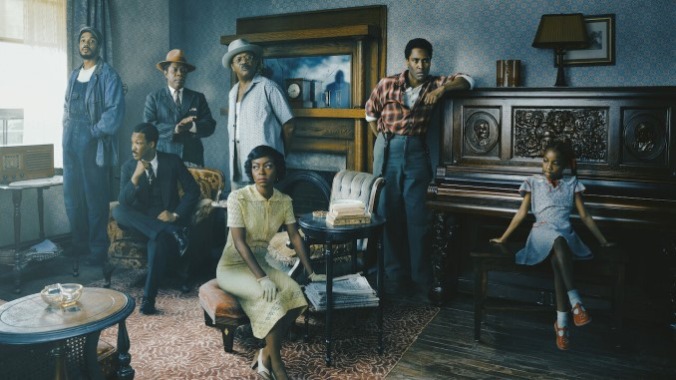The Piano Lesson Is An Impressive Directorial Debut by Malcolm Washington
Photos via Netflix
Adapting a stage play to cinema can be tricky business. Often the intimacy and defined parameters of a theater setting become a problematic albatross for screenwriters and directors trying to stay faithful to the spirit of the work. In the wake of Pulitzer Prize-winner August Wilson’s death in 2005, Denzel Washington has made it a personal priority to shepherd the playwright’s works to film for wider audiences. He starred in and produced Fences in 2016, and then produced 2020’s Ma Rainey’s Black Bottom and the latest, The Piano Lesson. And each adaptation has gotten progressively stronger, culminating here in director Malcolm Washington’s feature directorial debut, where his fresh eyes on the play, confidence with his actors and overall inventive approach to the themes and subtext of the play result in the best film of the trilogy.
Wilson’s play centers on the generational legacy of the Charles family, most recently of Sunflower, Mississippi. Just two generations separated from slavery, and still victims of the violence of the segregated South, siblings Boy Willie Charles (John David Washington) and Berniece Charles (Danielle Deadwyler) are living their adult lives separately. In Sunflower, Boy Willie’s got an opportunity to buy 150 acres of land from the family who enslaved his grandparents and great-grandparents if he can come up with the last bit of money to make the sale. Widow Berniece, meanwhile, lives in a nice house in Pittsburgh with their uncle Doakes (Samuel L. Jackson) as she raises young Maretha (Skylar Aleece Smith) in a relatively more progressive part of the country. As far as they’ve come, the family is still haunted by their recent past. Their ancestor’s trauma is literally personified in the intricately carved Charles family piano, which stands proudly in the front room of Berniece’s home.
For Berniece, the piano is a vessel for ghosts both literal and metaphorical. She and her mother have a sorrowful relationship with the instrument that requires Bernice, and in turn her daughter, to have distance from it. For Boy Willie, it’s his conduit to financial independence. If he can sell it, then he can buy the very land his late sharecropper father told him would be his path to freedom. And thus the conflict is laid out via an object that has its own particular history that will be revealed as the story unfolds.
-

-

-

-

-

-

-

-

-

-

-

-

-

-

-

-

-

-

-

-

-

-

-

-

-

-

-

-

-

-

-

-

-

-

-

-

-

-

-

-








































